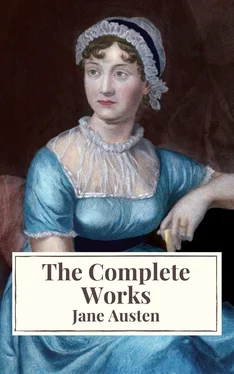She managed the recital, as she hoped, with address; prepared her anxious listener with caution; related simply and honestly the chief points on which Willoughby grounded his apology; did justice to his repentance, and softened only his protestations of present regard. Marianne said not a word.—She trembled, her eyes were fixed on the ground, and her lips became whiter than even sickness had left them. A thousand inquiries sprung up from her heart, but she dared not urge one. She caught every syllable with panting eagerness; her hand, unknowingly to herself, closely pressed her sister's, and tears covered her cheeks.
Elinor, dreading her being tired, led her towards home; and till they reached the door of the cottage, easily conjecturing what her curiosity must be though no question was suffered to speak it, talked of nothing but Willoughby, and their conversation together; and was carefully minute in every particular of speech and look, where minuteness could be safely indulged. As soon as they entered the house, Marianne with a kiss of gratitude and these two words just articulate through her tears, "Tell mama," withdrew from her sister and walked slowly up stairs. Elinor would not attempt to disturb a solitude so reasonable as what she now sought; and with a mind anxiously pre-arranging its result, and a resolution of reviving the subject again, should Marianne fail to do it, she turned into the parlour to fulfill her parting injunction.
Mrs. Dashwood did not hear unmoved the vindication of her former favourite. She rejoiced in his being cleared from some part of his imputed guilt;—she was sorry for him;—she wished him happy. But the feelings of the past could not be recalled.—Nothing could restore him with a faith unbroken—a character unblemished, to Marianne. Nothing could do away the knowledge of what the latter had suffered through his means, nor remove the guilt of his conduct towards Eliza. Nothing could replace him, therefore, in her former esteem, nor injure the interests of Colonel Brandon.
Had Mrs. Dashwood, like her daughter, heard Willoughby's story from himself—had she witnessed his distress, and been under the influence of his countenance and his manner, it is probable that her compassion would have been greater. But it was neither in Elinor's power, nor in her wish, to rouse such feelings in another, by her retailed explanation, as had at first been called forth in herself. Reflection had given calmness to her judgment, and sobered her own opinion of Willoughby's deserts;— she wished, therefore, to declare only the simple truth, and lay open such facts as were really due to his character, without any embellishment of tenderness to lead the fancy astray.
In the evening, when they were all three together, Marianne began voluntarily to speak of him again;— but that it was not without an effort, the restless, unquiet thoughtfulness in which she had been for some time previously sitting—her rising colour, as she spoke,— and her unsteady voice, plainly shewed.
"I wish to assure you both," said she, "that I see every thing—as you can desire me to do."
Mrs. Dashwood would have interrupted her instantly with soothing tenderness, had not Elinor, who really wished to hear her sister's unbiased opinion, by an eager sign, engaged her silence. Marianne slowly continued—
"It is a great relief to me—what Elinor told me this morning—I have now heard exactly what I wished to hear."—For some moments her voice was lost; but recovering herself, she added, and with greater calmness than before—"I am now perfectly satisfied, I wish for no change. I never could have been happy with him, after knowing, as sooner or later I must have known, all this.—I should have had no confidence, no esteem. Nothing could have done it away to my feelings."
"I know it—I know it," cried her mother. "Happy with a man of libertine practices!—With one who so injured the peace of the dearest of our friends, and the best of men!—No—my Marianne has not a heart to be made happy with such a man!—Her conscience, her sensitive conscience, would have felt all that the conscience of her husband ought to have felt."
Marianne sighed, and repeated, "I wish for no change."
"You consider the matter," said Elinor, "exactly as a good mind and a sound understanding must consider it; and I dare say you perceive, as well as myself, not only in this, but in many other circumstances, reason enough to be convinced that your marriage must have involved you in many certain troubles and disappointments, in which you would have been poorly supported by an affection, on his side, much less certain. Had you married, you must have been always poor. His expensiveness is acknowledged even by himself, and his whole conduct declares that self-denial is a word hardly understood by him. His demands and your inexperience together, on a small, very small income, must have brought on distresses which would not be the LESS grievous to you, from having been entirely unknown and unthought of before. YOUR sense of honour and honesty would have led you, I know, when aware of your situation, to attempt all the economy that would appear to you possible: and, perhaps, as long as your frugality retrenched only on your own comfort, you might have been suffered to practice it, but beyond that— and how little could the utmost of your single management do to stop the ruin which had begun before your marriage?— Beyond THAT, had you endeavoured, however reasonably, to abridge HIS enjoyments, is it not to be feared, that instead of prevailing on feelings so selfish to consent to it, you would have lessened your own influence on his heart, and made him regret the connection which had involved him in such difficulties?"
Marianne's lips quivered, and she repeated the word "Selfish?" in a tone that implied—"do you really think him selfish?"
"The whole of his behaviour," replied Elinor, "from the beginning to the end of the affair, has been grounded on selfishness. It was selfishness which first made him sport with your affections; which afterwards, when his own were engaged, made him delay the confession of it, and which finally carried him from Barton. His own enjoyment, or his own ease, was, in every particular, his ruling principle."
"It is very true. MY happiness never was his object."
"At present," continued Elinor, "he regrets what he has done. And why does he regret it?—Because he finds it has not answered towards himself. It has not made him happy. His circumstances are now unembarrassed—he suffers from no evil of that kind; and he thinks only that he has married a woman of a less amiable temper than yourself. But does it follow that had he married you, he would have been happy?—The inconveniences would have been different. He would then have suffered under the pecuniary distresses which, because they are removed, he now reckons as nothing. He would have had a wife of whose temper he could make no complaint, but he would have been always necessitous—always poor; and probably would soon have learned to rank the innumerable comforts of a clear estate and good income as of far more importance, even to domestic happiness, than the mere temper of a wife."
"I have not a doubt of it," said Marianne; "and I have nothing to regret—nothing but my own folly."
"Rather say your mother's imprudence, my child," said Mrs. Dashwood; "SHE must be answerable."
Marianne would not let her proceed;—and Elinor, satisfied that each felt their own error, wished to avoid any survey of the past that might weaken her sister's spirits; she, therefore, pursuing the first subject, immediately continued,
"One observation may, I think, be fairly drawn from the whole of the story—that all Willoughby's difficulties have arisen from the first offence against virtue, in his behaviour to Eliza Williams. That crime has been the origin of every lesser one, and of all his present discontents."
Читать дальше












